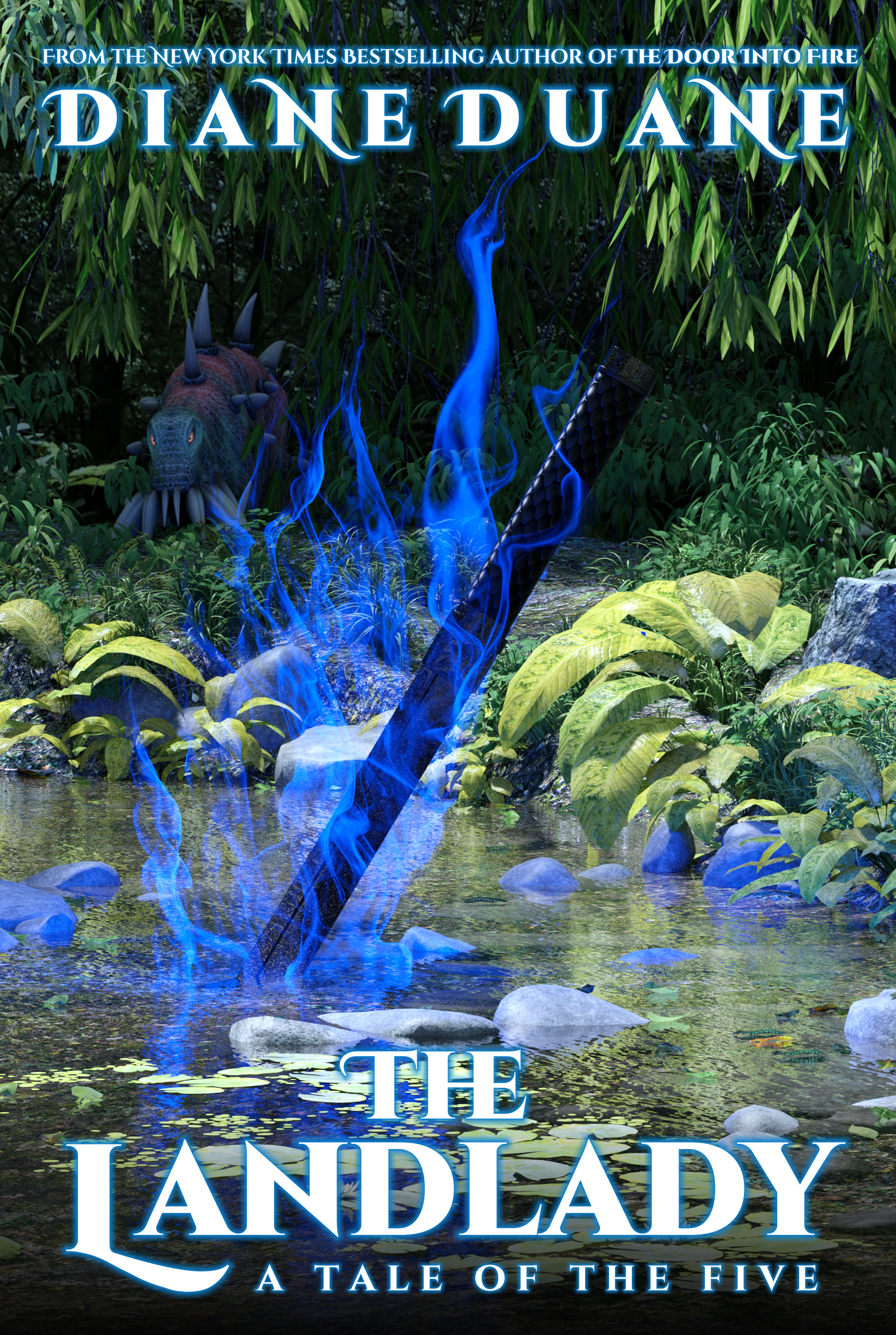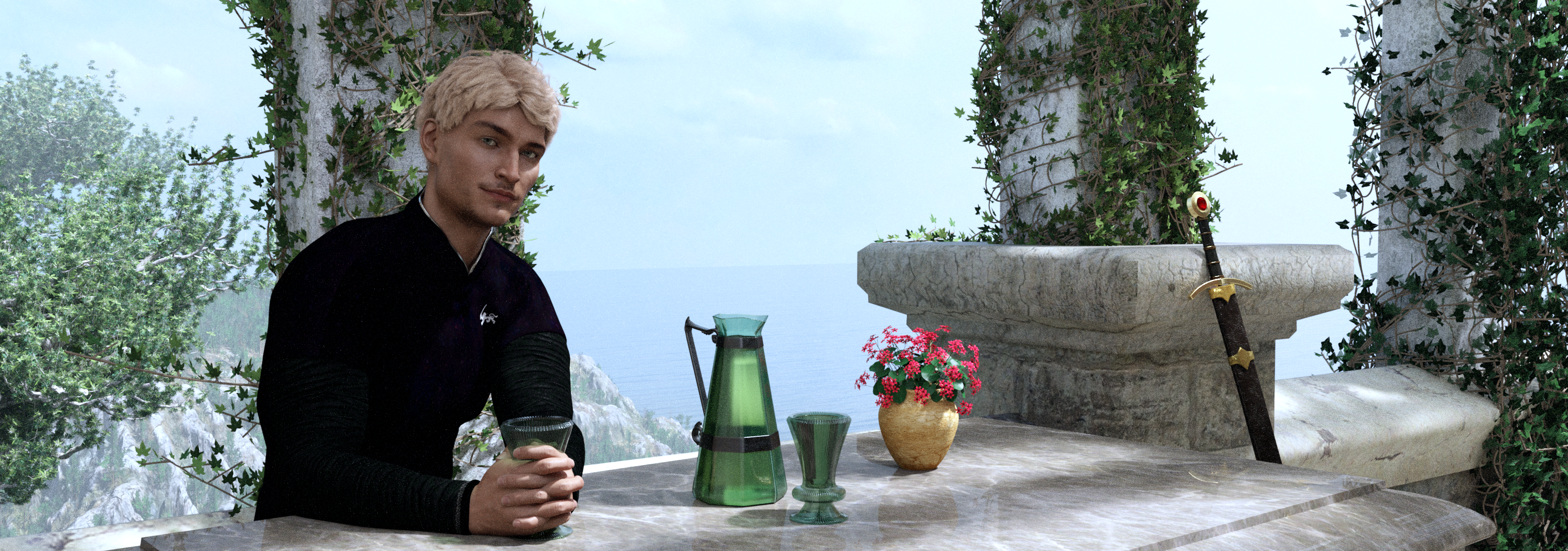Steldene Honey-Fried Apples
This very simple approach to apples as a side dish really deserves to be better known. Probably what’s interfering—on our Earth, anyway—is the Western food-culture tendency to keep savory seasonings in association with foods perceived as savory (meats, vegetables…) and sweet seasonings in company with foods perceived as sweet (fruits, etc).
This is a relatively recent development, much exacerbated by the Victorians. In the medieval and Renaissance periods, Western European cuisines in general were much more easygoing about combining sweet and savory flavors in the same dish. This recipe recalls—in an elementary form—this old tendency, which appears widely across cuisines in the Middle Kingdoms.
The basic recipe appears below, along with recommended variations, and a royal reminiscence about the dish as part of an outlaw’s life…
- The basic recipe
- Variations
- The backstory
Preheat your oven to 425F/210C. You’ll need a cast iron skillet for this dish, or other skillet that won’t mind being put in a very hot oven. But unenamelled plain cast iron is best.
Have ready:
- 2 eating apples (meaning a sweet-and-crunchy variety such as Red Delicious. (For our version of this recipe, we used the Jazz apple.)
- 2 cooking apples (green apples like Granny Smith or Bramley)
- 2-3 tablespoons lemon juice
- 1/3 to 1/2 cup honey
- 3-4 tablespoons butter (or the non-dairy frying fat of your choice)
- 1-2 teaspoons coarse sea salt, kosher salt or Maldon salt
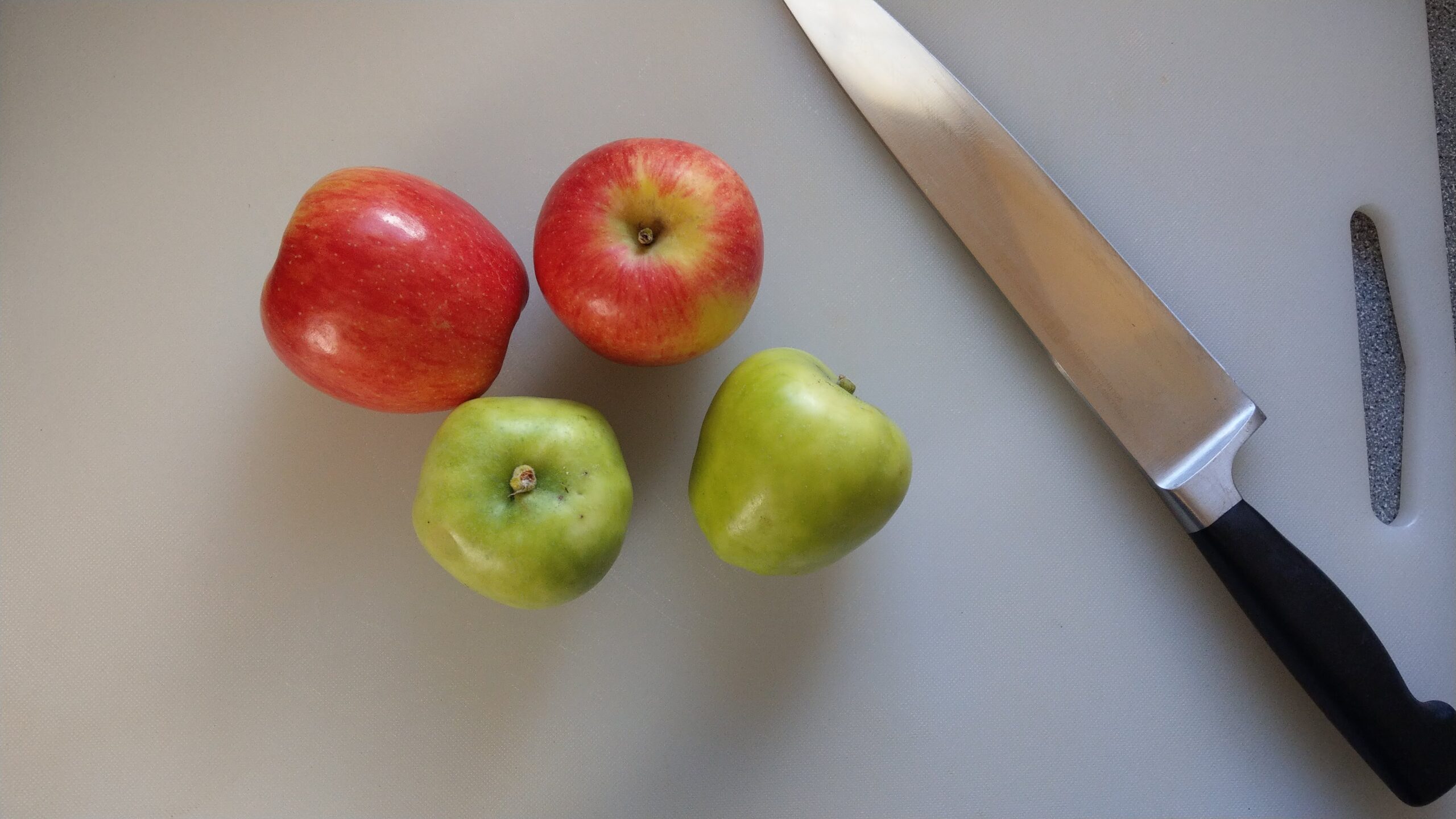
Wash and core the apples. (You don’t need to peel them unless you want to. However, the recipe works better with unpeeled apples.)
Chop the apples into approximately 1-inch chunks. Add the lemon juice and toss them together.
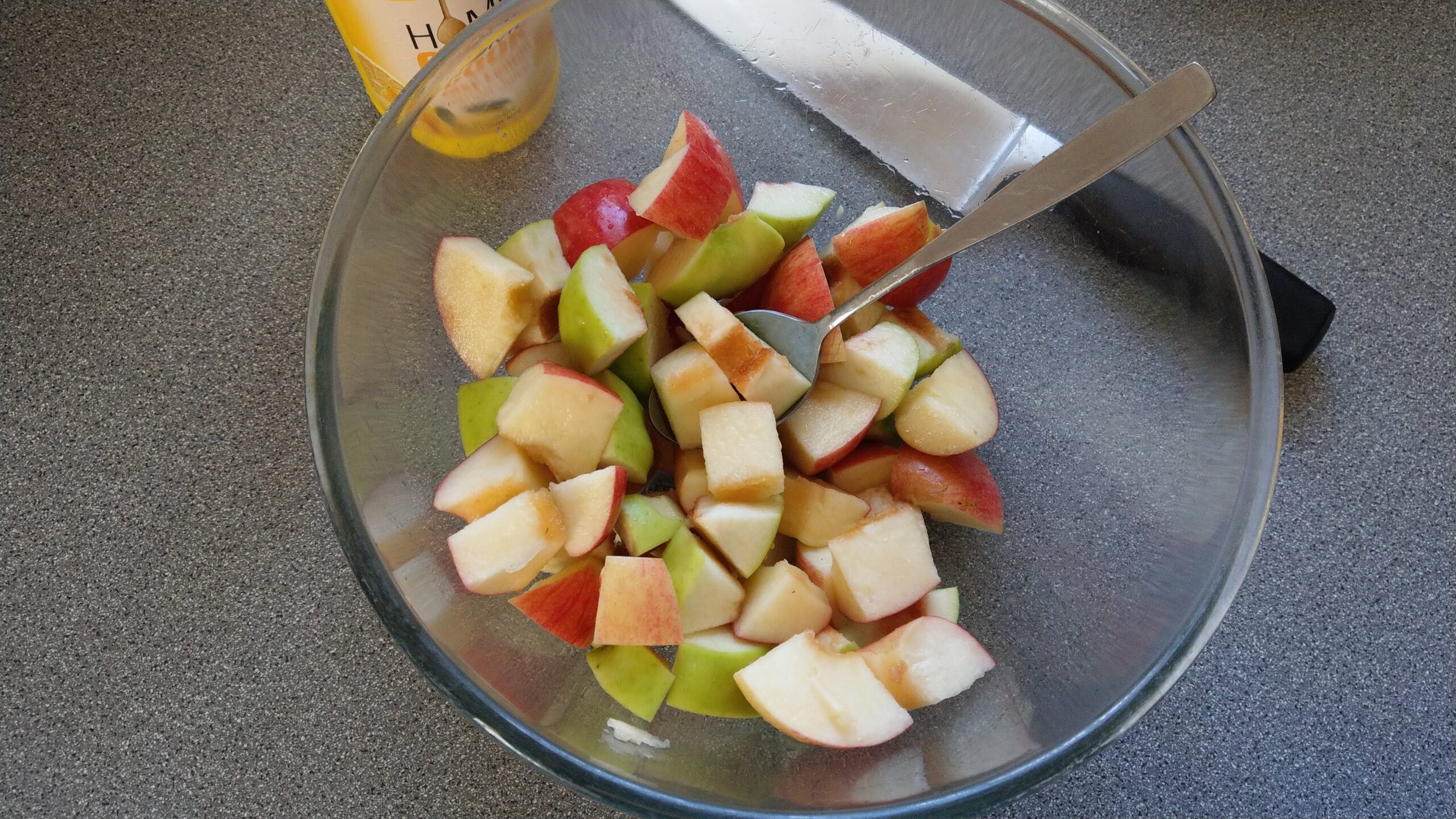
Put the butter (or other fat) into the frying pan over medium-high heat.
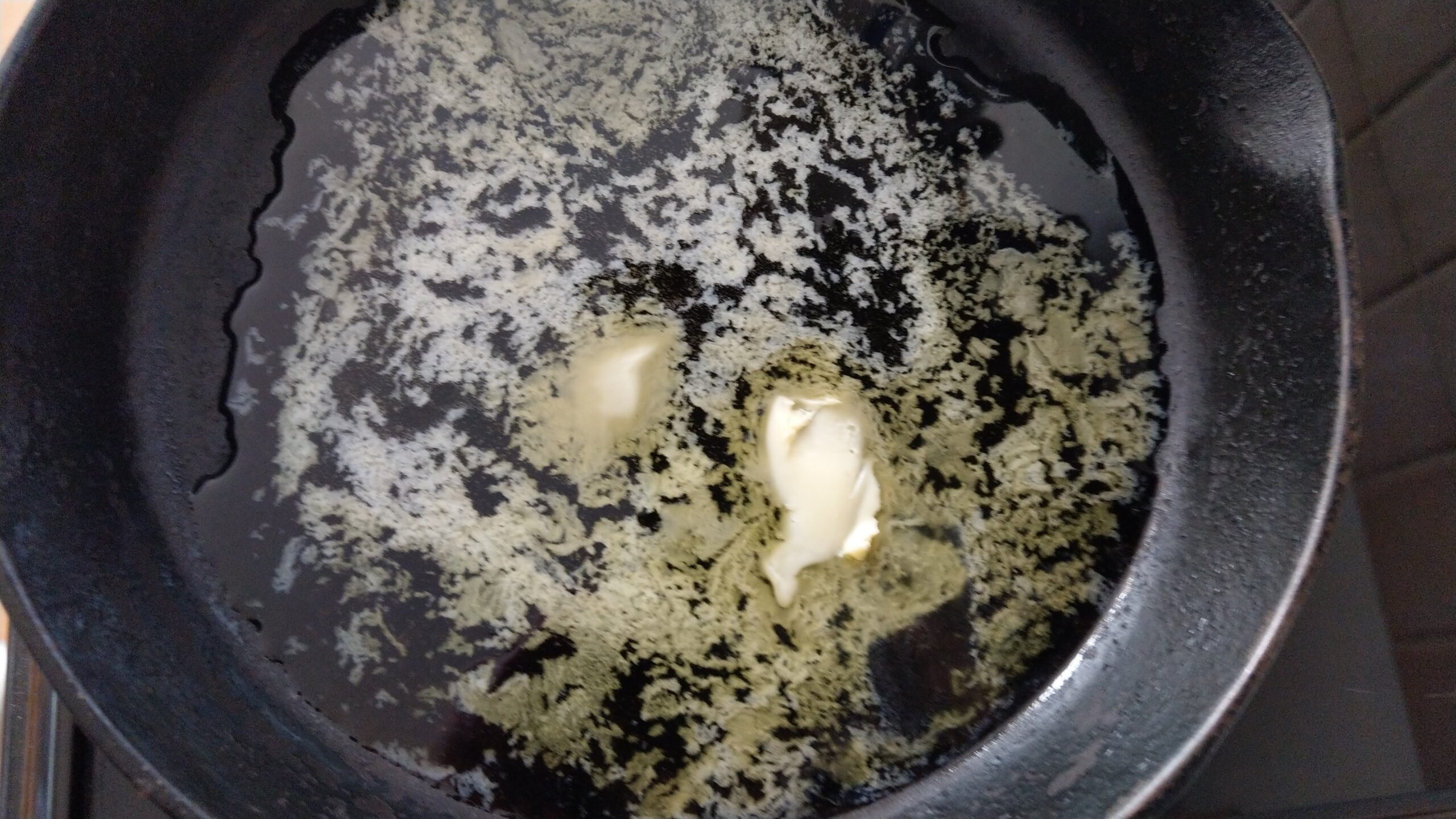
When it melts and (in the case of butter) is just beginning to brown, add the apples and the salt, and toss them well in the butter-or-whatever.
Sauté the apples for about 10 to 15 minutes until they start to brown. Keep an eye on their texture during this period: you don’t want them to start going at all soft until the browning process is finishing. If they seem to be softening too quickly, reduce the heat.
When the apples are nicely browned on their edges, remove from the heat. Add the honey (using the larger amount of honey if you think you’ll prefer a sweeter final result) and toss the apples in it to coat all their surfaces. Then put the frying pan in the oven.
Bake the apples in the hot oven for a further 10 minutes or so. (You can leave them in there as long as 15 minutes, but bear in mind that the longer they cook at this stage, the softer they’ll get.) Keep an eye on their color, as you don’t want them to scorch. When finished cooking, remove from the oven and allow to rest.
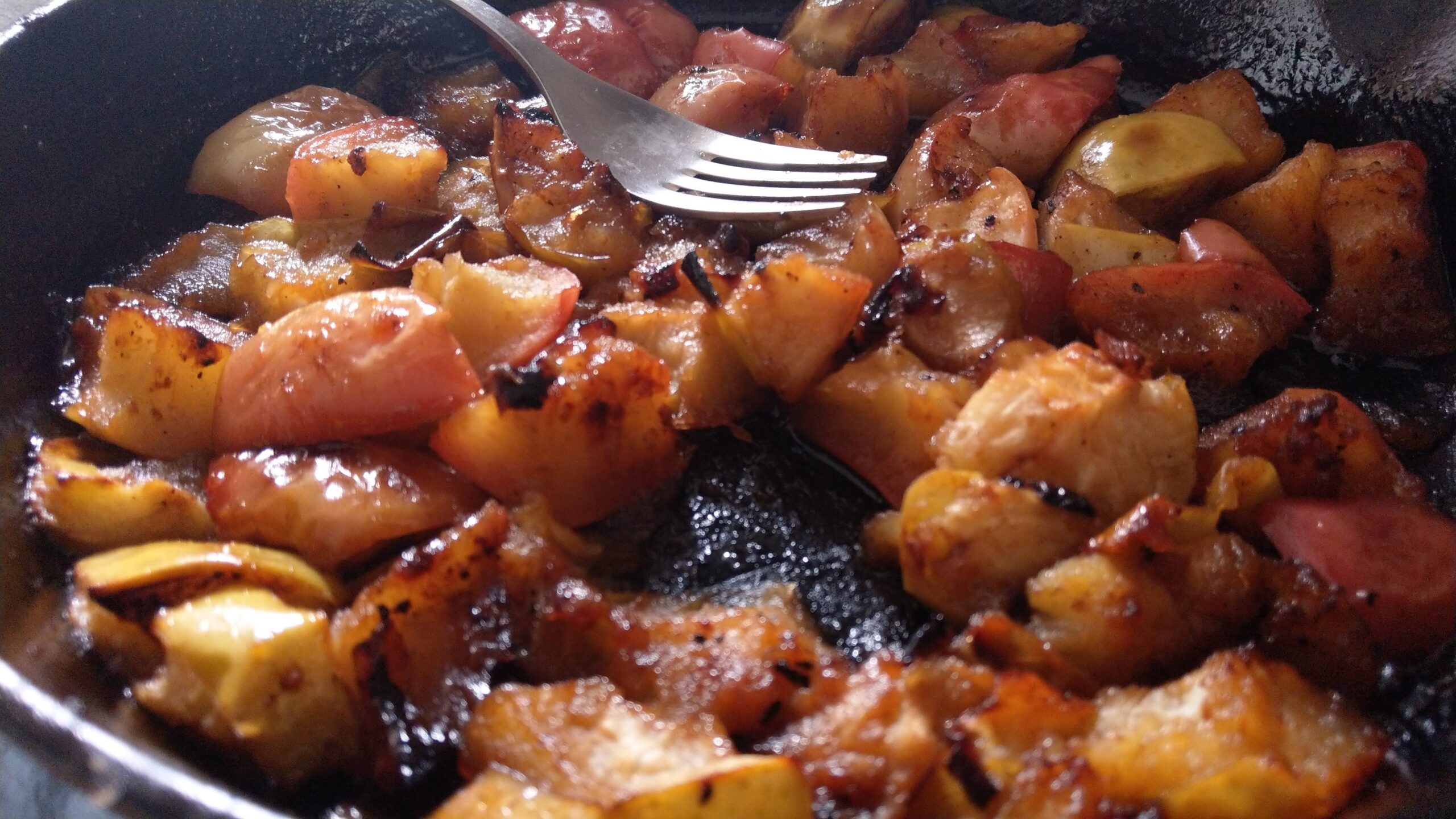
To serve, use a spatula as gently as possible to get the apples out of the pan without smashing them.
If combining the cooked apples with other ingredients, try to handle them as little and as gently as possible when doing the combination.
Enjoy!
The basic apple dish, once made, can be further cooked with other ingredients, or combined with them after cooking.
One very successful approach (shown in the slides at the top of the recipe page) is to combine the apples with previously roasted meats, especially pork. Cooking the pork with the apples layered around it produces a beautifully flavored jus.
Also, the basic technique of sauteeing and then finishing in the oven works extremely well with parsnips, with no significant change in the recipe.You might find it useful to chop the parsnips a little smaller than you would the apples, and let the frying pan have an extra ten minutes or so in the oven.
Finally, in alternate Earths where potatoes are available, sauteeing peeled and similarly chopped new potatoes with the apples, and then adding the honey and finishing them in the oven, produces an unusual and enjoyable result. (Note: your local potatoes may require a brief parboiling of 5-7 minutes in their skins before starting the sauteeing process. If the potatoes are new enough, there’s no need to peel them.)
“It may sound romantic in the poems,” says Freelorn of Arlen, turning his glass around a couple of times on the table. “Seven years an outlaw, always on the run with his little band of loyal followers, living off the bounty of empty lands…” He shakes his head, glancing up. “But when you get right down to the logistics of it…? It’s not much fun at all.”
We ran into the King at one of his preferred locals, the southernmost of the dozen or more public pleasances built around Prydon city—this one looking down from the southeastern city walls where the Bluff starts to slope down toward the wooded Menaskh and Talsasmë townlands. The view from here across the river Arlid toward Darthen is quite beautiful, even on a somewhat misty day, and it’s understandably a popular spot. When we arrived, the place was already full of City and “outwall” people who didn’t mind the climb up to a park and dining space famous for its Arlene country-style food.
Predictably, King Freelorn declined to tell us whether this particular local was his favorite. It’s well known in the City that he’s got several favored taverns and eating- or drinking-spots scattered around Prydon, but there’s no way under the Goddess’s sky that you’ll get him to admit which one he most prefers. “Does it really matter?” he says when you press him. “The whole point—besides just wanting to get out somewhere different for nunch—is to be somewhere that people can just walk up to you as if you were anybody else out for a bite or a sup of an afternoon. They’ve got a right to know that I take my responsibilities seriously: and my work… which is being here for them.” He chuckles. “And making sure they know I’m not afraid to be alone with them.”
“So you don’t visit with a retinue, then.”
He looks shocked. “Absolutely not! If I’m a good king, it’s my people’s business to keep an eye out so that no one makes off with my life without them having a say. And it’s my business to trust them to do that. If I’m a bad king—” Freelorn shakes his head. “Well, we have legal remedies for that, if the Goddess or the Lion don’t step in themselves to handle it. Either way, it can get pretty gory before matters are settled. But fortunately that doesn’t seem to be a problem for me at the moment.” The smile is both relieved and wry—the expression of a man who knows from experience how quickly things in politics, or kingship, can change.
The King has a drink of his wine. “But that’s not what you were really interested in talking about, was it. Eating on the road…?”
He rubs his brow, then shakes his head with a rueful look on his face. “At first it was interesting, even exciting,” Freelorn says, “when the bloom was still on it. When we all thought that the people who’d exiled me would see sense, in weeks or months, and there’d be a recall. But weeks got to be months, and months leaned toward a year… Soon enough we came to realize that being the romantic sort of outlaw that turns up in the old songs—dodging into town and out again for necessities, slipping into taverns in disguise—wasn’t an option that was real, these days. If it ever had been.” The King’s expression is that of a man who can’t believe what an idiot he was. “Once you’ve tried it once or twice and felt the tension—trying to eat like a normal person while you can’t help listening to every voice around you for an accent or a dialect that means they might have reason to be a little too interested in you—” He rolls his eyes. “In the songs, the common people are always on your side. But in my case? When times have been getting hard, and the price on your head’s more than most people would need to live on for five years at a time…?”
A laugh of pure amusement at his own witlessness. “So. There we were, just the five or six or seven of us… running for our lives. Or—let’s be truthful—mostly running for mine.” And the smile the King’s been wearing goes very dry indeed. “So we were always traveling very light, because packhorses have to be fed, not to mention stabled if you’re anywhere near people… which we learned not to be, pretty quickly. Ducking casually into some town’s market? Not when you might be recognized, and never in a group. Even one person alone had to be careful, because… Well, if you’re a townsman, and somebody you’ve never seen before comes into the local half-month market and buys as much food as one rider can carry, and then rushes off with it? Country people get curious… and suspicious. Who wants outlaws in their neighborhood, after all?” He shakes his head. “That kind of behavior gets that lone rider followed, and then…”
The King heaves a long sigh that seems to boil down to meaning “serious unspecified trouble.” “…So that’s something you learn not to do. Especially when, even if you could afford a market run, money’s still always an issue. You’re thinking ‘If we spend it now, what about next month?’ …And even when you can afford it, it’s not smart to be carrying a lot of food when at any moment—in the middle of the afternoon, in the middle of the night—you have to throw everything onto the horses and just go, because some local opportunist whose lands you’ve recently ridden over has put it all together and figured out who you are. Or made an educated guess.” Freelorn shakes his head, laughs at himself again.
“So all that comes to mean that you resign yourself pretty quickly to living off the land—the unpeopled land—as much as you can. And you learn a lot of things in a hurry… and some more slowly.” He has a drink of his wine, looking thoughtful. “You learn to harvest wild grain, if it’s ready; and how to fire it so you can eat it green, if it’s not. You learn to bake flat bread in a pot over the fire, and get over it bringing up memories of town-bakery bread you’ve loved and won’t get to eat again any time soon. You get really good at killing game, and learning how to dry meat over the fire for another day, another week. You learn that if you try to live too long on just rabbit, you’ll get very ill indeed. You learn that you’d better have at least some vegetables with all that game, or your insides rebel against you and make it really hard to ride. You learn to forage, and to be smart about it —for example, not to pick all the viol-head fern you find, no matter how much you want to, because you might wipe out a supply you’ll need again, some day. You learn that fruit helps keep you from getting sick, and you learn how to deal with drying that too, when you can.” He sighs. “All the while, you learn never to assume you’re going to find enough to eat. And how to distract yourself from an empty stomach.”
He sips his wine, puts it down, gazes into it. “But sometimes conditions are kind,” the King says. “We spent a lot of time in Steldin. Funny, you might think, when the Steldenes were the ones who were hottest to collect the bounty on my head! But between the climate and the terrain, the far south of Steldin near the Peaks is some of the loneliest country in all the Realms. And because of the weather up south, in the summers there’s a lot of good fruit scattered around, free for the taking. Apples, especially: not something you can get every day… especially not down north. Moris came up out of nothing with this dish, one time…and after that there were times when we all practically lived on it, because it was nearly all there was, and we didn’t even mind. Apples pot-roasted in honey, with belly pork roasted in with it if you’ve got some.” He shakes his head and grins, apparently at himself. “My Goddess, it’s ridiculous, we lived on that for sometimes days at a time, over the years, and it’s still making my mouth water—!”
The pleasance’s taverner is passing by, and the King catches her eye, picks up the empty pitcher sitting on the table, wiggles it at her. She rolls her eyes at him, nods, and moves on. “And Stelet,” he calls after her, “wait a breath! Are the roast turnips on today?”
The taverner looks back at him, her eyes crinkling in amusement. “Small or large, King?”
“Large, please.”
The taverner nods again and walks on into the pleasance-house to see about his refill. “I missed breakfast…” says the King. “Anyway, we all got to be pretty good cooks as regarded simple things. Probably Moris was the best cook of us all. But then he worked in the kitchen at the Black Palace for a while, did you know? The Queen’s always teasing him about it. After him, Lang would probably have come in a close second—a natural talent. He even wound up teaching Segnbora how to cook. Until he got to work on her, she was no good at that at all.” His eyes went a little distant. “Of course, the two of them were getting quite close at that point.” A sidewise look out of hazel eyes. “I expect you know about that, though. I know a chronicler when I see one.”
“Oh. I’m sorry, I’ll—”
His eyebrows go up: an amused expression. “What? No, sit down, for Goddess’s sake. This happens to me oftener than you might think. It’s not as if the biggest archive in the Kingdoms isn’t just up the hill! Believe me, I get a lot of this.”
After that for a few moments the King says nothing, just turns his glass around and around a few times on the table’s polished stone. …“Seven years of it, though,” he says. “Of never being sure of where your next meal, and your friends’, is coming from. And of not knowing whether getting it is going to somehow get you killed… or one of those friends. Don’t get me started on the wild pig stories.”
“Ah. Well. I’ll make a note to avoid those.”
Freelorn laughs. “Do. …But what a life like that does for you, again and again, is show you how hard the people you rule may be having it… not just sometimes, but a lot of the time. What you’re doing, they too must often do if the weather’s been bad for the crops. So when you finally take up the job to which you were born and bred, you do whatever you must to make sure there’s always grain in your people’s storage bins to grind, and that their markets, and the movement of food from region to region, are protected. And subsidized, when they need to be. Because that’s what the Queen of the World gave you this job for: making sure your people are fed. Ideally you do that with your brains, and your realm’s money. But if that’s not working out, then you do it with your heart’s blood ploughed into the ground to make the fields bear.” His expression, as he says this, is strangely gentle.
“…Surely that doesn’t happen very often, these days.”
“These days? No. Normally if the land doesn’t bear for a couple of seasons running, the Four Hundred press whoever’s sitting in the Throne to step aside in favor of someone else in the royal line better suited. And they do. Because if you’re the one enthroned at present, the price of your rulership is being ready to do what the realm needs…even if it kills you.”
Freelorn stretches briefly, then settles again on the bench. “Meanwhile, if these days the King’s got a bit of a reputation for enjoying his food, I’d say that’s just fine. Because it means that every time he sits down to a meal where he doesn’t have to be looking over his shoulder to see if someone sitting a few tables over is trying to work out whether his head’ll fit in the bucket of brine they brought with them…” He shrugs. “Then it means that, every time, he’s got leisure to think of the friends who made sure he got this far… and to thank Herself for them.” And he leans back, tilting his glass, and twists it just enough to let a drop’s worth of libation fall on the paving: then drinks.
“…But enough about me,” he says, as the new pitcher of wine arrives and he puts his glass down again. Those hazel eyes glance up from it and without warning become very sharp, very focused indeed, as he pushes the spare glass over and pours it half full. “With an accent like that,” says the King of Arlen, “you’re not exactly from around here, are you? Let’s talk about you.”



